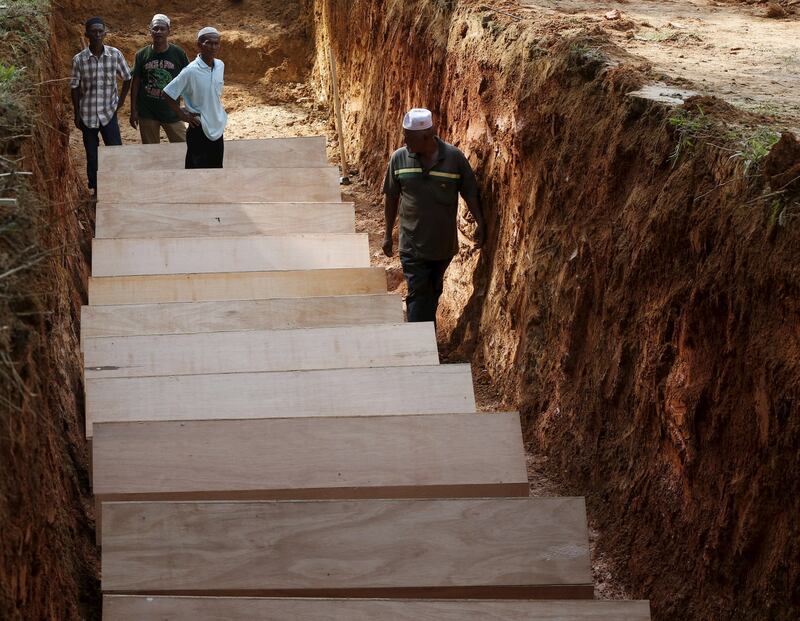A Malaysian court is expected to charge four Thai nationals Friday in connection with the 2015 discovery of graves of more than a 100 human-smuggling victims found at jungle camps near the border with Thailand, Malaysia’s home minister said.
The Thai suspects were handed over to Malaysia on Thursday as part of a 2017 extradition request by Kuala Lumpur and an investigation into the discovery of mass remains of Rohingya and Bangladeshi human smuggling victims in shallow graves in Wang Kelian, a village in Perlis state.
“They were handed to us on June 22 and will be brought to the Sessions Court in Perlis to be charged on Friday,” Home Affairs Minister Saifuddin Nasution Ismail said in a statement but without disclosing details.
A senior Malaysian police official, who asked that his identity be kept anonymous because he was not authorized to speak to reporters, said the Perlis police chief was scheduled to hold a press conference related to the Thai nationals on Friday.
“The four will be charged with human smuggling,” he told BenarNews, an RFA-affiliated news outlet.
In January 2015, Malaysian authorities found 139 mass graves and 28 abandoned camps scattered near the rocky hills along the Thai-Malaysia border at Bukit Wang Burma in Wang Kelian, but waited four months to exhume the bodies.
More than 100 skeletal remains, believed to be those of members of Myanmar’s stateless Rohingya Muslim minority, were found in the graves while other remains apparently belonged to undocumented migrants from Bangladesh.
After a cluster of similar mass graves were discovered at jungle camps abandoned by human smugglers on the Thai side of the frontier, Thailand in early May 2015 launched a crackdown on illicit immigration that triggered a humanitarian crisis in Southeast Asia.
Close to 3,000 ethnic Rohingya from Myanmar and Bangladesh nationals, abandoned by their handlers on smugglers’ boats, suddenly came ashore in Malaysia and Indonesia. It was only after the news of the Thai graves made headlines that Malaysian authorities publicized the discovery of the graves in Wang Kelian and moved to recover the remains of the victims.

A Malaysian government-commissioned panel inquiry report made public last October found that officials could have prevented the torture and deaths of the smuggling victims if they had taken "a more proactive step in border control."
“It did not require any extraordinary effort to detect what had happened in Bukit Wang Burma,” according to an excerpt from the Royal Commission of Inquiry report.
“The Commission regards the incident at Wang Kelian as a humanitarian tragedy that should never have happened in this day and age.”
No Malaysian has been charged in connection with the 2015 discovery. Only four foreign nationals have been convicted and imprisoned.
But in Thailand, prosecutors tried 102 people linked to 32 graves found on its side of the border. Of the 62 people convicted, one was a three-star general, who died in prison while serving an 82-year sentence.
‘No form of trial on our side’
Malaysia’s home minister said this latest development was the result of close cooperation between his country and Thailand. Malaysia had in 2017 sought the extradition of 10 Thai nationals.
“As a result of close collaboration between the two countries, four of the 10 individuals were tracked down and presented at a Thai court to face extradition,” Saifuddin said.
“The extradition proceeding took place at many courts in Thailand, and the Thai Court of Appeal on March 30 this year ordered the four individuals to be handed to Malaysia.”
However, Mohd. Mizan Mohammad Aslam, a professor at the National Defense University of Malaysia, would like to see a more active investigation on the Malaysian side.
“In Thailand, many people have been arrested for being involved in the crime and ended up in prison,” he told BenarNews.
“However, on our side, we have yet to take any action seriously; there has been no form of trial on our side.”
He urged the Malaysian authorities to find local suspects involved in the case and put them behind bars.
“I believe that if no serious action is taken, such crimes can flourish again and create another Wang Kelian,” he said.
BenarNews is an RFA-affiliated news outlet.
